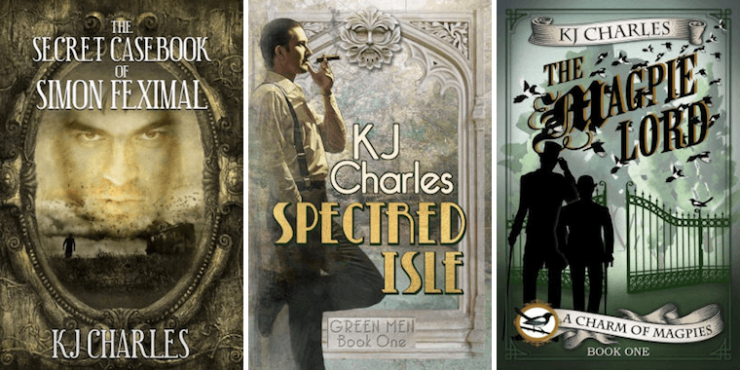Let me tell you about KJ Charles, an author you should check out if you haven’t already, if you enjoy fantasy books.
In my experience, people who’ve read at least two of Charles’ books (she’s published about twenty of them) have a tendency to then read extensive swaths of her backlist. Her novels provide something rare in the literary market even today, in 2018: well-researched historical, fantastical fiction that features love stories between queer people.
Genres are flawed, porous constructs, and many stories live in between the established categories or straddle several of them, which doesn’t make a bookseller’s job very easy. The reason we recommend a book by saying “it’s X genre” is that it’s a shortcut to saying: “it’s the sort of thing you like.”
So, to be clear, if we had to pick just one box to put Charles’ books in, that box would read “Romance” with a capital R. The focus of the stories is always a relationship between two people, and that relationship ends happily, for various values of “happy,” every time. But many books that are considered primarily SF/F are also centered on relationships, and many of those relationships also end happily—for example, Jacqueline Carey’s Kushiel’s Dart, Zen Cho’s Sorcerer to the Crown, and Gail Carriger’s Soulless (the last two even take place in settings similar to Charles’).
Buy the Book
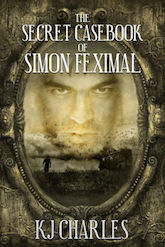

The Secret Casebook of Simon Feximal
The Secret Casebook of Simon Feximal is a pastiche/tribute/alternative universe version of Sherlock Holmes, an ever-popular form of reinventing the cultural canon. (It’s been recently explored in SF/F by Claire O’Dell in A Study in Honor and Aliette de Bodard in The Tea Master and the Detective.)
Simon Feximal is a somewhat gruff, eccentric but brilliant ghost hunter at the very end of the 19th century in London. His main aim is to help people, and he frequently saves them from mysterious, unexplained spells of bad luck, or solves bizarre murder cases, but you wouldn’t know it from his introverted nature. Robert Caldwell is a journalist who initially meets Feximal when he needs help with a haunted mansion that Caldwell inherits from a distant relative. After a few other run-ins, they begin a relationship that lasts for over twenty years. Caldwell, forced out of his original career, becomes Feximal’s chronicler, writing stories about his exploits much the same way Watson did with Holmes.
But Charles’ book isn’t a collection of those stories. Instead it’s the “secret” casebook, the one Robert Caldwell was unable to commit to print and ordered be published only after his death, containing the censored bits, missing scenes, and subtext made explicit from a fictional larger body of work. In Charles’ book, Caldwell can finally express the real truth of his life: that he solved supernatural mysteries not with his dear friend but with his lover. That they lived in the same house not because it was convenient, but because they were a couple.
While the book begins as a very obvious Sherlock Holmes pastiche, it also builds a supernatural world—in a way, it’s as if all the red herrings in Sherlock’s cases that pointed to spirits and spells and ghosts were real in this universe. Feximal’s backstory is quite different from Holmes’: adopted as a boy by an occultist who already had a daughter, he and his sister were subjected to cruel experimentation that left them with different superpowers. One of Caldwell’s “censored” stories concerns tracking down Feximal’s “father,” barred from further occult business, and begging for his help in saving Simon’s life.
The price for this help requires Caldwell to make sacrifices, and one of the conditions is that Feximal and Caldwell have to be in close proximity to each other for the rest of their lives. But of course, forcing the two together isn’t really a punishment—something no one realizes and works to the heroes’ advantage.
Charles often uses the fact that gay people had to hide much of their lives in 19th century England to complicate her plots and demonstrate how secrecy and cultural erasure could occasionally be a blessing…but often were a curse.
Buy the Book
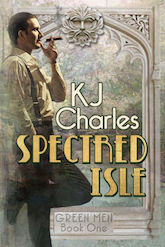

Spectered Isle
In Spectered Isle, Charles returns to the same universe, now an England dealing with the aftermath of the first World War, in which the government forced occultists, including women and men too old for the draft, to aid in Britain’s war effort. In the supernatural arms race England lost the vast majority of its “powerful” people, after too many summonings of unnatural forces have shredded the veil separating our world from the beyond. While in Feximal’s stories ghosts are rare and difficult to summon, in Spectered Isle England is teeming with supernatural activity and many things that shouldn’t be possible, or were never possible before, suddenly are.
The changes reflected in the post-war social order, with many noble families losing their fortunes and England undergoing a social shift, also affect the occult world. Having brought occultists under government control in the name of king and country, Whitehall now wants to consolidate that power and reform the occult world, turning a network of unofficial connections into a centralized government office that handles occult business and tells everyone what to do.
At the center of this attempted power grab are two traitors. Randolph Glyde, scion of an ancient English family that’s produced the guardians of various English sites of supernatural power and protection (such as Camlet Mote) for many centuries, and Saul Lazenby, an Oxford archeologist and former soldier.
Glyde abandoned his family at the end of the war and refused to aid in further occult warfare; after their deaths, he ends up carrying all their collective supernatural responsibilities by himself. Lazenby was stationed far from home and had a secret affair with a local man who then passed on information about Lazenby’s garrison to the Ottomans who wiped them all out. Lazenby, the only survivor, was dishonorably discharged, spent two years in prison and returned to an England where no one would hire him to so much as sweep the streets.
Spectered Isle introduces the Green Men, a collection of people with supernatural powers, some inherited and some thrust upon them, who attempt to sort out their own lives and priorities while attempting to protect England from everything from fen-grendels to vastly powerful, vengeful spirits bent on destroying London. These include soldiers who endured experimentation during WWI and have become “abominations” (complete with occasionally appearing tentacles) as well as Feximal and Caldwell’s adopted children, who are either born with abilities or acquire them to help carry on the cause.
The wonderful thing about Charles’ writing is that it’s grounded in a very mundane, well-researched atmosphere, where British society is complex and layered and the weight of history is felt throughout. But at the same time her stories are whimsical and cheerful, dealing with people who’ve been through terrible things but still find a way to carry on, reconciling not only their secret superpowers but their queerness with the social norms of the age.
That said, if you’d like a world less about ghosts and mythological creatures, preferring one that deals with more “proper” magic and its politics and philosophy in the style of Jonathan Strange & Mr Norrell, there’s always Charles’ other supernatural universe, the Charm of Magpies series.
Buy the Book
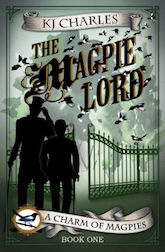

The Magpie Lord
Published in 2013, it’s difficult not to see the influence of Susanna Clarke in the first book, The Magpie Lord, in particular. In this universe some people are born with magical abilities which are broadly connected to natural elements, like being able to manipulate air or water. But magic is also a craft that can be learned and honed, and has been known to the government forever. The legendary practitioner known as “The Magpie Lord” codified its use and established a magical “police” called the justiciary to work as part of the government, keeping an eye on magic users to make sure that their powers don’t cause serious harm.
The exploration of this universe across the five books of the series (as well as several free short stories and one novella) deals with questions about how powerful but extremely rare magic users should be handled. The first few books focus on justiciar Stephen Day, whose family was ruined by their association with a powerful noble who held a terrible grudge. Stephen considers himself a competent magic user who’s spent a long time studying and perfecting his craft, but his job as a magical cop feels like a daily uphill battle. The department is barely budgeted and the job requires frequently risking his life and hoping he’s stronger than other, often far more privileged practitioners.
In Stephen’s eyes, the justiciary is the country’s only line of defense against people who have enough money to be tempted by absolute power, who can use their magical abilities to take over the government or subjugate innocent people. As magical energy always has to be drawn from somewhere, practitioners are forever tempted to draw it from ordinary humans, in a sort of cannibalism that eventually does end with the victim wasting away to nothing.
In later books, however, other protagonists offer a very different view. Jonah Pastern, who first shows up in Stephen’s stories as a clever antagonist and later gets his own narrative, was an orphan boy with the ability to manipulate air and therefore essentially fly. He was found early by the justiciary, who turned him over to a couple of practitioners who were supposed to teach him better control over his powers and bring him into the larger magical community.
Instead, his foster parents used Jonah as unpaid labor and never bothered to educate him at all. Coupled with the fact that he was illiterate (and, it is implied, dyslexic), there was no recourse for him, as was the case for many orphan children in the late 19th century who found themselves with no social safety net beyond the kindness of strangers.
Jonah eventually builds a life for himself, but that life is predicated on stealing and conning people using his powers—something that eventually attracts the justiciary’s attention. Since Jonah is now an adult, the justiciary opts for punishment rather than reform. Jonah’s sentence is that his Achilles tendons will be cut, “hobbling” him in both the magical and the physical sense.
The person on Jonah’s trail and eager to administer the punishment? Stephen Day. In the eyes of someone who comes from the opposite of privilege, Stephen appears to be a terrifyingly powerful practitioner who’s used to acting as judge, jury, and executioner. All Stephen has to do is consult a few colleagues, for example his boss Esther Gold, to decide someone’s fate. Since magical powers are so rare and the Magpie Lord gave justiciars absolute authority (as an alternative to practitioners avenging their own grievances or dispensing mob justice) the government is content to let people like Stephen decide who should be injured for life, and who should be killed.
Buy the Book
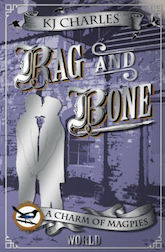

Rag and Bone
In Rag and Bone, we find another part of the puzzle: a practitioner named Crispin who was unwittingly the apprentice of a warlock—a practitioner turned “cannibal”—and now that his master has been killed by the justiciary, Crispin’s fate is in question. If he can prove that he can use magic productively, as it should be used, before Stephen Day retires and Esther Gold goes on maternity leave, he can be released into the world. If not, he’ll likely be executed.
Crispin’s boyfriend is Ned Hall, a Londoner of African descent, and together they have to save the city while the justiciary is busy with bigger problems. It serves to further underscore how much the magical community is terrible at taking care of vulnerable people—perhaps even more so than the British government, because it’s forced to operate in secret. Terrible things can happen to someone when keeping their essential nature from the population at large is a major priority. That’s true for magic as it is for queerness.
In this series in particular, Charles constantly underscores how the need to maintain secrecy could often complicate an otherwise uncomplicated life, or make a tricky situation untenable.
For example, Stephen Day’s partner is Lucien Vaudrey, the new Lord Crane, unknowingly a descendant of the Magpie Lord himself, though born without any magic capabilities, who spent most of his life in exile in Shanghai as his father’s disappointing second son. One of the ways to transfer magical energy is through bodily fluids. And as Crane is an enormous source of such energy, being a descendant of the Magpie Lord, Stephen quickly starts drawing more and more of it simply by having sex with him regularly. This presents a problem, as Stephen’s justiciary colleagues notice the change and wonder where his immense power is coming from. If relationships between men weren’t illegal, Stephen could publicly explain what was happening. But as it is, Stephen has to keep the relationship secret and get into further and further trouble, as suspicions about him being a warlock begin to mount.
Charles’ books blend history and magic in relatively unusual ways for mainstream SF/F. The focus on queer relationships allows her to highlight how systems of oppression can sometimes be “beneficial” (in giving the protagonists a secret no one knows about, something their enemies don’t anticipate), but mostly complicate magical lives and make everything more dangerous in a setting that’s firmly grounded in real history.
So, why isn’t Charles better known in SF/F circles? Maybe we don’t always have to pick a single box to put a story in. Maybe we should make room and try stories that use the tropes of our genre even if they’re primarily capital-R books. Maybe now that you know more about KJ Charles, you’ll check out her work? But even if you don’t, or you find that it’s not to your liking, I hope I’ve at least introduced you to a different kind of fantasy than what you’re used to.
An earlier version was originally published in November 2018.
Marina Berlin is an author, poet and media critic who grew up speaking three languages in a city by the sea. Her writing has appeared in Vice, IGN, The Los Angeles Review of Books, Strange Horizons, and other venues. You can read some of her stories and poems on her website or read her opinions about your favorite book/movie/TV show on Twitter @berlin_marina.










